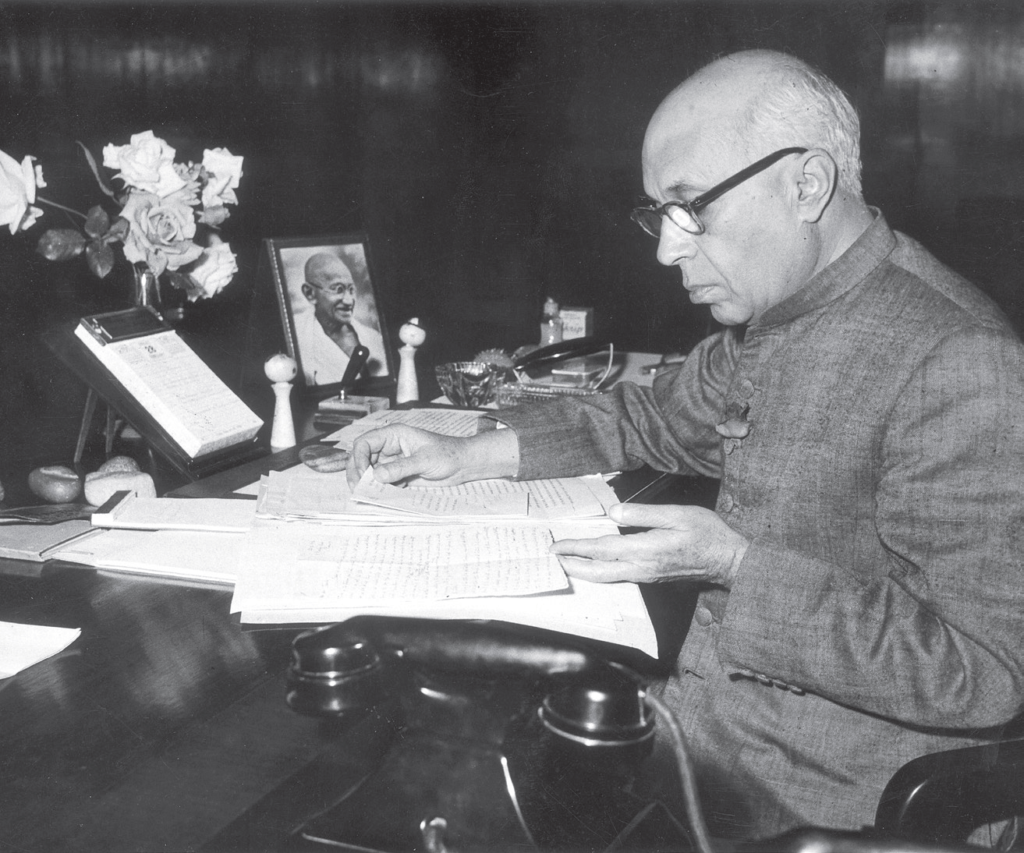[From: Science and Gandhi, Selected Works of Jawaharlal Nehru, Orient Longman Ltd., New Delhi (1973) (First Series), Vol. 5, pp. 510-514.]
Allahabad, September 1, 1933
Dear Mr. Huxley [1 & 2]
A short while ago, I read in prison a little book called Science in the Changing World.
A passage in your broadcast, included in this book, surprised and distressed me a little. [3]
According to this, you said that Tolstoyans and Gandhi-ites advocate a “return to Nature” and want people to abandon science altogether and live like primitives or, at least in the medieval style. If this advice was followed, you pointed out, it would result in the sacrifice of eight or nine hundred million human lives, a slaughter compared to which the massacres of Timur [4] and Jinghiz Khan [5] sink into absolute insignificance.
l am not competent to say anything about the Tolstoyans but I have been closely associated with Mr. Gandhi and the “Gandhi-ites” for the last fourteen years and can thus presume to know something about them. Indeed, in a political sense, I have myself been a Gandhi-ite” for all these years. I feel that, quite unintentionally, you have done them a grave wrong in the reference you have made. And as Mr. Gandhi is the unquestioned leader of the Indian national movement, it is more than likely that many people who listened to your remarks or read them subsequently, were led to misjudge the nationalist movement by them and to imagine that it stood for a most reactionary and lunatic policy which if logically carried out, must lead to a frightful catastrophe.
I do not propose to discuss Mr. Gandhi’s personality in this letter. He is a complete person and has many aspects which astonish the modem mind. Essentially he is a man of religion and essentially the typical modem is not. Finding, what he considers, too much indulgence about him, he lays stress on the ascetic ideal. In particular, his ideas about sex relations seem extraordinary to most people of our day. All this is, what I might perhaps c dl, Mr. Gandhi’s personal philosophy, and those who look upon him more or less as a religious or moral leader presumably accept it to a greater or lesser extent. Mr. Gandhi no doubt realizes that his strict personal code cannot be followed by more than a handful of people, but he hopes that this handful will set an example which will result in toning up the lives of large numbers of others.
His attitude to science is very far from being hostile. He welcomes it and takes advantage of it in a variety of ways, and often people, wilfully misunderstanding him, accuse him of inconsistency because he does so, as for instance, when he submits to an operation or rides a motor car, or uses a printing machine, or telegraphs or telephones. None the less, it is perfectly true that, being fundamentally religious, his tendency is to seek for the truth inside himself, rather than externally by the methods of science.
Large-scale machine production he does not like but he has never suggested, to my knowledge, that it should be scrapped. He wants, as far as possible, to decentralise industry, to have small units and not large ones, and for this purpose he wants to take the fullest advantage of the scientific method. He thinks that this ought to suit modem conditions but in case it does not, why then, he is perfectly prepared to have something else. In either event there is no question, so far as he is concerned, of ignoring any advantage that science has to offer.
This, in brief, is Mr. Gandhi’s personal attitude to science and industry, it may not be a correct attitude; its logic may be faulty. But it does not mean a negation of science or a destruction of machine industry. Possibly it may result in a lessening of production and in this sense it may be a putting back of the clock. Even so it could hardly be madder than the present deliberate restriction of output, both in industry and agriculture and the actual destruction of large quantities of foodstuffs and other useful articles which millions lack.
Even this attitude is not necessarily accepted by the political associates and followers of Mr. Gandhi. Personally, I do not agree with it, and I should like to make it perfectly clear that the Indian Congress and the National movement have not adopted it. Indeed Mr. Gandhi has never asked the Congress, except in one particular, to endorse this attitude. That one particular is, as the world knows, the cottage spinning wheel. The Congress has recommended hand-spinning to the agricultural classes of India not because of any hostility to machinery or science, but because of special reasons applicable to the Indian peasant under present conditions. The spinning wheel is not to be the rival of machinery- it would be absurd to say so; nor is spinning to take the place of any other occupation. Agriculture, as it is carried on here, is not a full-time job for the whole year. There is intense activity at harvest time and some other times and then there are several months of unemployment. The peasant and his family were encouraged to spin during this seasonal unemployment as well as during their leisure hours. It was thus to be a kind of secondary occupation, an auxiliary industry for him, so long as he had no other and better way of employing his spare time. Spinning was also to be a partial stand-by for the vast numbers of unemployed who have nothing to do and who are such a burden on the land. It is a remarkable fact that, contrary to the universal tendency, in India the rural population has grown at the expense of the urban during the last hundred years and right up to our day.
The obvious way to absorb these scores of millions of unemployed and partially employed is to provide other occupations for them by industrialising the country. Scientific agriculture may lessen the peasant’s waste time and increase the yield but the immediate result would be to add to the unemployment. Hand-spinning cannot solve these problems or put an end to unemployment, whole time or seasonal. If we had the state power in our hands we would certainly adopt a host of other methods, including industrialization. As it is, we are helpless and can only work in a limited sphere. In the limited sphere there is no doubt that hand-spinning and its associate cottage occupations have brought a small measure of well-being to those who have taken it up. The real objection to widespread cottage spinning is that by bettering slightly the conditions of those who adopt it, it helps to prop up a land system and an economic structure which are indefensible and which are in process of breaking down. A radical socialist would rightly object-to this attempt at propping up a doomed structure.
In these days of economic nationalism there is one other factor which is worth considering. In the event of a crisis where India has to rely on her own resources, spinning can fill the gap so far as cloth is concerned. A war may stop all imports; the Indian mills may fill the gap but they are not in the position to do so wholly yet. No doubt they will grow. Meanwhile, they have a way of exploiting a crisis to their own great advantage by raising prices, as they did during the Great War, when there is no outside competition. A widespread movement of hand-spinning is some check on this raising of prices and it helps the country to clothe itself when there is a cloth famine.
These are some obvious considerations, and there are others of a political nature such as the boycott of foreign cloth, which induced the Congress to recommend hand-spinning. There is also a human side to the spinning-wheel and the weaving of homespun cloth. They have brought the intelligentsia nearer to the peasant masses and reduced the vast gap which our one-sided education had produced between them. I have mentioned these considerations to you not to defend the spinning wheel but so that you may realise that Indian nationalism is not opposed to big-scale machinery and much less to science.
I have no doubt that when it is in a position to do so, it will industrialize the country as rapidly as possible. Meanwhile, helpless as we are, we have to carry on with such makeshifts as are available.
To touch a personal note. My whole outlook on life and its problems is a scientific one and I have never felt attracted towards religion and its methods. (I took the natural sciences tripos at Cambridge). I entirely disagree with Mr. Gandhi’s views on sex, birth control, asceticism etc. I believe in the machine and would have it spread in India but I believe also in the social control of it. I would like India to have socialism and a widespread industrialization. Believing all this, would it be possible for me, or the large numbers who are like me, to cooperate closely for years with a person who stands for a policy which is inimical to science and industry and which might lead to a dreadful holocaust? And is it for this that we spend long years of our life in prison?
Forgive me for writing at such length to you. One gets rather tired of misrepresentations and propaganda when most, of us are shut up in prison and a rigid censorship prevails outside. Often it happens that the most amazing propositions are advanced by our critics and opponents as representing our views and this imaginary and unreal structure is then demolished with great gusto. I know you could not have meant to misrepresent us and that is why I wanted to make you appreciate to some extent what our position was. I do not want you to take the trouble to contradict anything that you have said or to correct yourself.
We met once-an all too brief meeting. It was during the Congress session at Cawnpore in December 1925. I tried to find you and your wife later but you had gone. You will hardly remember me but I have had many occasions to renew that acquaintance through your delightful books.
I have only just come out of prison after serving out a two-year sentence. I hasten to write to you for soon, within a few days perhaps, I am likely to go back again-to muse on the earthly paradise and the various bars, of iron and of the spirit, which prevent us from reaching it.
Yours sincerely,
Notes
[1] J.N. Correspondence, N.M.M.L.
[2] (1894-1963); well-known writer of novels, essays, biography and short stories, visited India in the winter of 1925 and published his diary under the title Jesting Pilate.
[3] Huxley wrote: “….Tolstoyans and Gandhi-ites tell us that we must “return to Nature” — in other words, abandon science altogether and live like primitives or, at best, in the style of our medieval ancestors. The trouble with this advice is that it cannot be followed – or rather that it can only be followed if we are prepared to sacrifice at least eight or nine hundred million human lives. Science, in the form of modem industrial and agricultural technique, has allowed the world’s population to double itself in about three generations. If we abolish science and “return to Nature”, the population will revert to what it was-and revert, not in a hundred years, but in as many weeks. Famine and pestilence do their work with exemplary celerity. Tolstoy and Gandhi are professed humanitarians, but they advocate a slaughter, compared with which the massacres of Timur and Jinghiz Khan seem almost imperceptibly trivial.
[4] Tartar chieftain who invaded India in 1398 and sacked Delhi.
[5] Chengiz Khan (c. 1155-1227); a Mongol conqueror who subjugated most of Asia and penetrated into Europe.
(Article courtesy: Mainstream Weekly.)




